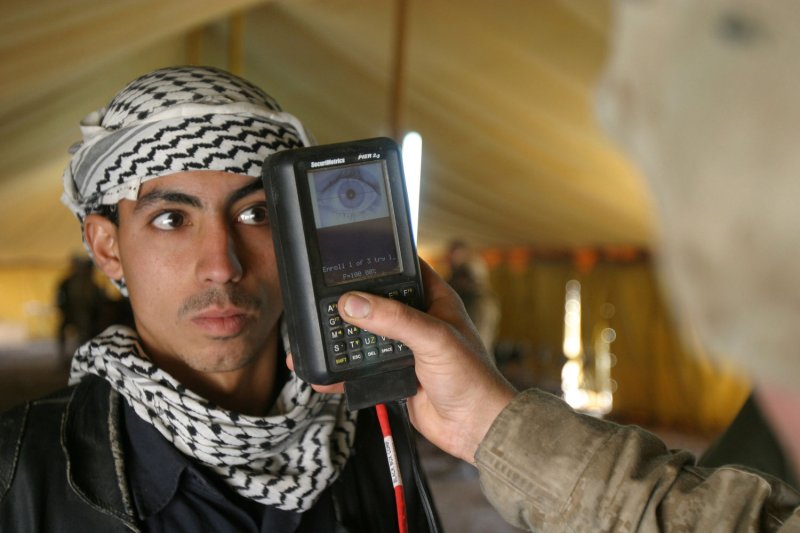Marine Lance Cpl. Luis Molina scans an Iraqi citizen's retina at Brahma Park in Fallujah, Iraq, on Jan 25, 2005. In the United States, the Orlando international Airport will become the first airport in the United States to scan the faces of all international passengers, including U.S. citizens. File Photo by Jonathan C. Knauth/U.S. Marines |
License Photo
June 21 (UPI) -- The Orlando International Airport announced Thursday it will become the first airport in the country to require face scans of all passengers arriving or departing on international flights, including U.S. citizens.
Customs and Border Protection says the facial recognition scans compares the traveler's face to others on the Department of Homeland Security's watch list databases.
"We are at a critical turning point in the implementation of a biometric entry-exit system, and we've found a path forward that transforms travel for all travelers," CBP Commissioner Kevin McAleenan said in a statement.
CBP says the process takes about two seconds, has a 99 percent match rate and will save passengers time.
But critics say the facial recognition program has serious flaws and is an affront to privacy.
A recent report by CAPA Centre for Aviation said the software's match rate was lower than CBP says -- about a 96 percent match rate. And when scanning faces of ethnic minorities, the rate was even lower, which could result in incorrect identification.
And Harrison Rudolph of the Center on Privacy and Technology at Georgetown University Law School, and a co-author of the CAPA report, told NPR in March that there are no privacy safeguards.
"DHS hasn't issued a single rule under this program to protect Americans' privacy," Rudolph says. "So what DHS decides to do with this information tomorrow, I'm not sure. And without rules there may be few protections for Americans' privacy."
But Phil Brown, CEO of the Greater Orlando Airport Authority, said the facial recognition program will make airline travel faster and more convenient for passengers.
"By incorporating biometric technology into our entry and exit processes, safety, security and speed are optimized so customers can enjoy a more streamlined and comfortable journey through Florida's busiest airport," Brown said.
CBP plans on expanding the facial recognition program and currently has test programs in Miami, Atlanta, New York JFK, San Diego, Houston (Intercontinental and Hobby), Washington Dulles, Las Vegas and Chicago O'Hare, as well as Preclearance locations in Aruba, Abu Dhabi, and Ireland (Shannon and Dublin).















